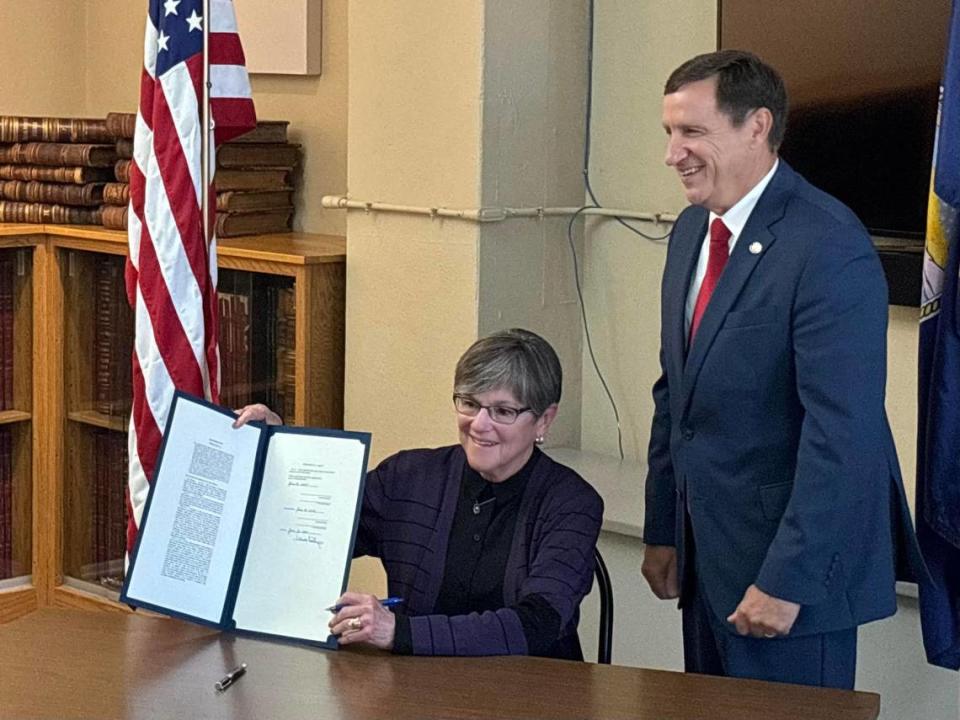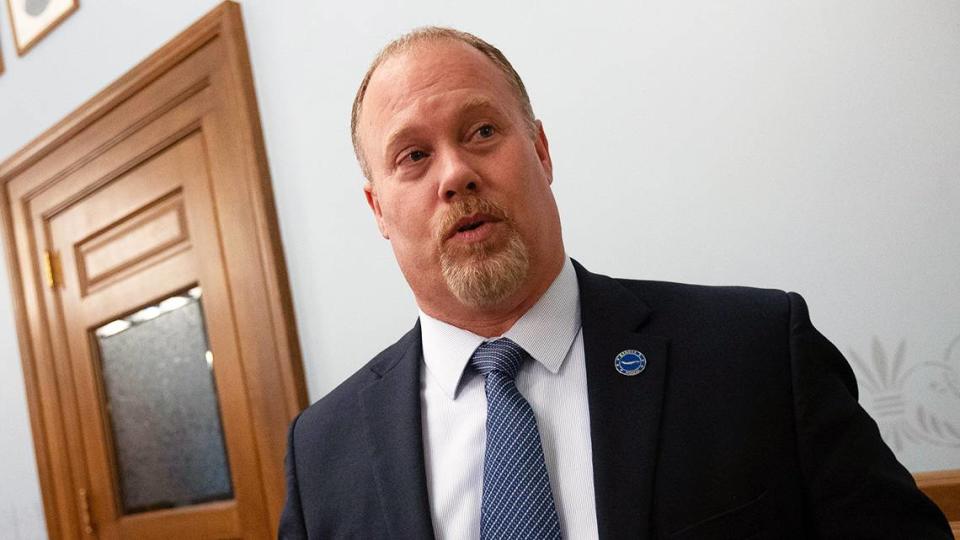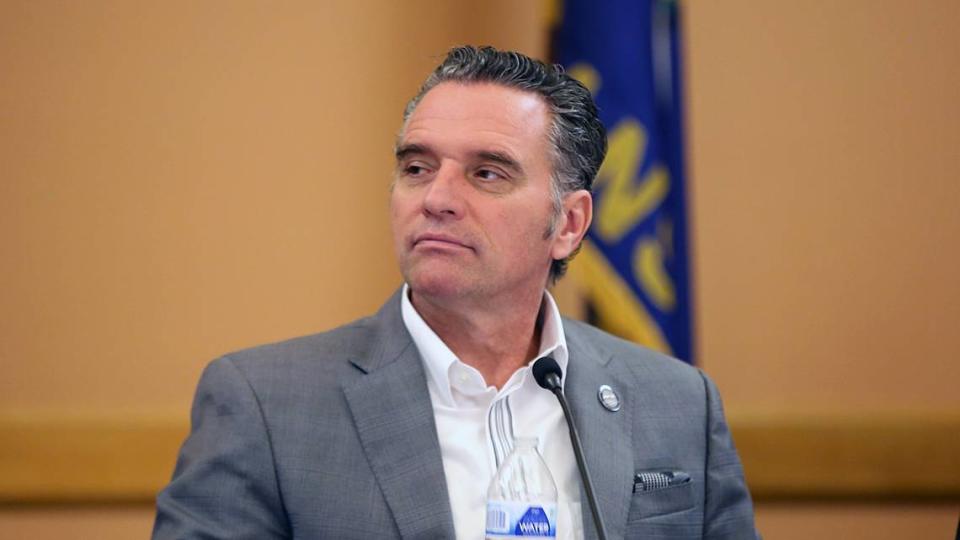As Kansas home values rise, major property tax relief will wait until at least next year
Reality Check is a Star series holding those with power to account and shining a light on their decisions. Have a suggestion for a future story? Email our journalists at RealityCheck@kcstar.com.
Kansas Democratic Gov. Laura Kelly and top Republican lawmakers hailed the tax cuts package signed into law in June as significant relief for residents. But on property taxes, no one views the new law as a smashing success.
The compromise reached by Kelly and GOP leaders contained only a modest property tax cut, even as lawmakers almost universally say high property tax bills are the biggest complaint of constituents. Instead, action in the statehouse focused largely on income tax reductions.
Demonstrating the anger over property tax bills, the Wyandotte County-Kansas City, Kansas, Unified Government’s commissioners voted last week to not collect additional property tax revenue in the next budget year. The decision came after a contentious hours-long public hearing where residents voiced frustration with the size of their bills.
“You’re gonna tax me out of my house,” Tony Burks, a Kansas City, Kansas, police officer who has taken on two extra jobs, told UG commissioners. “I’m gonna be living in a cardboard box with my family. I’d move if I could, but I can’t because I want to keep my job.”
The Wyandotte County Appraiser’s Office has reported the median home price stands at $235,000, roughly 27% higher than in 2022. In Johnson County, the median home price was $440,000 last year, a nearly 8% jump from the year before, according to the annual appraiser’s report.
Kansas lawmakers insist they will advance substantial property tax relief next year.
“We fully agree that not enough was done on property taxes,” House Speaker Dan Hawkins, a Wichita Republican, said at the end of the one-day special session in June when the Legislature passed the bill.
Lawmakers floated several ideas this spring that they would likely bring up again, including additional exemptions, a lower statewide mill levy and even a constitutional amendment limiting rising home valuations. Whether previous proposals could pass or become law in 2025 remains an open question.
Property taxes are among the most odious forms of taxes to lawmakers and voters. They are also among the most difficult to overhaul.
Several factors drive what homeowners pay. The first is the appraised value of a property, based on its fair market value – and the values of many homes have risen sharply in recent years.
The second is the assessed value of the property, or the percentage of the appraised value that is taxed. In Kansas, the assessment ratio for different categories of property is set in the state constitution. Residential property is assessed at 11.5% of appraised value, agricultural land at 30% and commercial property at 25%.
The third is the mill levy. Counties, cities and school districts each set their own mill levy, with one mill constituting $1 per $1,000 of a property’s assessed value. Kansas also has a statewide levy of 20 mills that helps fund public education.
Local officials in Wyandotte and Johnson counties often point to diminished revenue sources cut by state lawmakers in years past as creating a heavier reliance on property taxes. Examples include the elimination of machine and equipment tax and the Legislature’s continued withholding of state sales tax dollars meant to ease property tax levies.
Over the past two years, plans to address property tax concerns in the Legislature got caught up in larger tax debates. The fight over tax cuts centered on what to include in a single, sweeping tax bill – rather than passing several smaller pieces of tax legislation.
The eventual compromise lawmakers passed that Kelly signed included only a single substantial property tax provision, which exempted the first $75,000 value of a home from the statewide mill levy. Previously, the first $40,000 was exempt.
Hawkins blamed Kelly for the limited property tax changes, saying the governor set a target size for the overall package that lawmakers couldn’t exceed. The package is expected to eventually cost the state roughly $375 million a year in revenue. For her part, the governor faults legislative leaders for emphasizing income tax over property tax reductions.
Kelly may be hesitant to sign any additional tax cut measures – including property tax changes – over concerns about whether the reductions would be sustainable.
The governor signaled on Tuesday that future reductions may depend on projections of future state revenue. The next official forecast will be released in November.
“I have to wait for the numbers, of course,” Kelly told reporters after a ceremonial signing of the tax cuts bill in Holton. She added that at the moment she is unsure how much more the state can do.

Homeowners upset
Waiting until 2025 for more relief will almost certainly further anger homeowners, including in the Kansas City metro. Wyandotte County residents are especially furious, with many saying they’ve been pushed to the breaking point.
Voters in the Kansas City, Kansas, Public Schools district in May rejected a proposed $420 million bond issue, in large part because the measure would have increased property taxes. For a resident with a home valued at $150,000, the yearly property tax bill was expected to go up by $146.63.
Last week’s public hearing held by the Wyandotte County-Kansas City, Kansas, Unified Government underscored those frustrations.
“People in my neighborhood that are retired, that do not have mortgages because they paid off their homes years ago, cannot afford to live in them anymore,” Kansas City, Kansas, resident Alex Sanchez said.
Tori Walker, a music teacher, said she moved to Kansas City, Kansas’ Morris neighborhood in part for its affordability.
“Little did we realize that the lurking monster of property tax increases would soon come to haunt us and threaten the wellbeing of our family,” Walker said.
In Johnson County, commissioners intend to exceed the revenue neutral rate and collect additional property tax revenue to help buoy next year’s $1.8 billion budget. Officials said if the county were to forgo those added dollars, it would collect $23.5 million less in revenue.
The decision comes as county staff warn that the budget will become unsustainable over the next five years, as previously soaring property appraisals start to level off, sales tax revenue declines and other pressures including rising costs and inflation take a hit. That has led to talk of potential cuts from the budget in the coming years.
For the next year, commissioners plan a quarter-mill reduction in the tax rate, saying they hope to ease the burden on taxpayers. While commissioners highlighted they have similarly lowered the tax rate in seven of the past eight years, the budget discussion has become tense at times, as some feel more should be done for homeowners as appraisals climb.
“We just forget that there is such a major, major burden on the single-family homes,” Commissioner Charlotte O’Hara, who opposed the proposal last week, said. “We have not tried at all to reduce costs.”
Johnson County Chairman Mike Kelly said that was untrue, adding that most departments have found ways to trim their budgets, such as cutting positions in the appraiser’s office, while the county has maintained a lower tax rate than its neighbors.
Several property tax ideas
Amid homeowner anger, Kansas lawmakers are weighing a variety of responses. Each would adjust the property tax system in a different way – but with few guarantees they would substantially lower property tax bills.
Some lawmakers support further increasing the residential exemption. While the new tax cuts law raised the exemption from $40,000 to $75,000, earlier proposals had set it at $100,000.
Lawmakers also previously weighed lowering the statewide mill levy for schools. An earlier plan would have lowered the mill levy from 20 to 19.5, with the lost revenue made up by other sources.
House Republicans have floated both of those ideas as options next year.
“We’re going to come back next year, we’re going to try to get something done in the first few weeks of session so the budget process already has that to plan for and can account for that in their budget,” said Rep. Adam Smith, a Weskan Republican who chairs the House Tax Committee.

Other proposals are more aggressive and more controversial. The Senate in 2023 passed a state constitutional amendment that would limit annual valuation increases to 4% – a direct response to soaring home values in recent years.
The proposal, which would have to be approved by voters if lawmakers pass it, would curb sharp valuation spikes but wouldn’t necessarily reduce property tax bills. Local governments would be free to raise mill levies to compensate, although local officials may think twice about repeatedly voting to raise the mill levy.
Senate President Ty Masterson, an Andover Republican, said his chamber remains interested in an amendment as a means to curtail what he called “out of control” property evaluations. He said simply lowering the statewide mill levy to some degree represents a tax transfer because the funds are backfilled by sales or income tax revenue.
“I think what you’re hearing is there’s a lot of interest in property tax relief moving forward but that just wasn’t something we could do during this one-day special session,” Masterson told reporters, referring to the amendment.

Over time, critics say the amendment would create significant differences in the tax bills of neighbors with similar homes because the valuations would reset to market value whenever a home is bought or sold. Homeowners who stay put for long periods would benefit the most from the annual cap, while individuals who want or need to move would surrender any tax advantage.
Sen. Ethan Corson, a Fairway Democrat, said his first concern with the amendment is that homeowners would feel they’ve gone through a “bait and switch” because property tax bills might still climb. Second, he expressed concern with moving the property tax system away from fair market values for homes.
In shrinking areas of the state, local officials may have an easier time funding government services without raising mill levies because rising property values will result in growing revenue. But in growing areas, such as Johnson County, it’s harder for cities, counties and school districts to forgo additional revenue because of the growing demand for services.
“It’s a challenge” to stay revenue neutral, Corson said.
Sen. Caryn Tyson, a Parker Republican who chairs the Senate Tax Committee, has championed the amendment. She said homeowners face an unfair advantage under the current valuation system.
Tyson said individuals in homes that haven’t been upgraded or remodeled are penalized because neighbors remodel or sell at higher prices, sending valuations higher.
“They expect people to go and protest their appraisals and go through the system in order to defend a lower price point for their home they’re living in,” Tyson said. “Not everyone has the capacity to do that.”
Even if the Legislature approved an amendment, it might not go before voters until late 2025 or 2026 – after another one or two tax years.
For now, homeowners’ best bet for combating high property taxes may be political pressure on city council members, county commissioners and school board members.
Wyandotte County-Kansas City, Kansas, Unified Government staff had painted a potentially bleak financial picture for the county without additional property tax revenue as an option. But commissioners rejected that advice after dozens of residents spoke at the hearing.
They voted 9-0 to kill a resolution that would have allowed for a budget partially sourced on increased property tax revenue.
“Our people are being crushed by taxes. Mainly property tax,” said Rep. Mike Thompson, a Bonner Springs Republican. “Our campaign has knocked on thousands of doors and the only thing we hear is our property tax is killing us.”
The Star’s Sarah Ritter and Jenna Barackman contributed reporting


